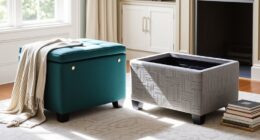To stop hoarding, experts emphasize using effective decluttering methods. Start with the Four-Box Method: sort items into 'keep,' 'throw away,' 'donate,' and 'sell' piles. Consistency is key—implement daily routines to maintain organization and practice the "one in, one out" rule to prevent re-cluttering. Seeking professional help can provide tailored support, while involving family can create a team effort. By embracing these techniques, you can transform your space. There's even more to explore on this journey.
Key Takeaways
- Utilize the Four-Box Method to categorize items into 'keep,' 'throw away,' 'donate,' and 'sell' for effective decision-making.
- Engage professional help for compassionate support and tailored decluttering strategies that address emotional and practical challenges.
- Implement daily routines and the "one in, one out" rule to maintain organization and prevent re-cluttering.
- Focus on small areas with micro-decluttering to achieve quick wins and build momentum in the decluttering journey.
- Celebrate milestones in your decluttering process to reinforce positive habits and maintain motivation for a clutter-free life.
Understanding Hoarding Disorder
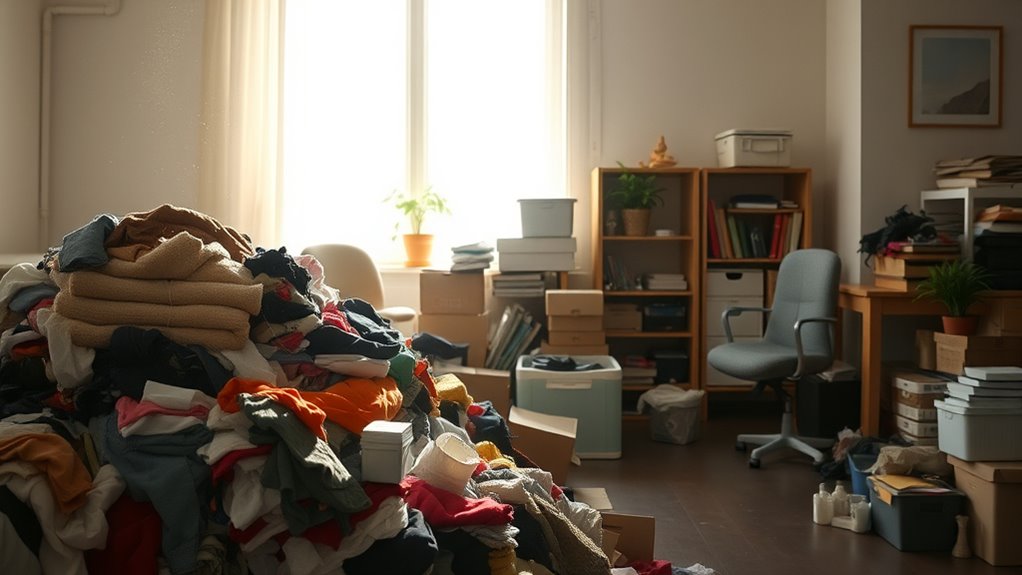
Understanding hoarding disorder is crucial, especially if you or someone you know struggles with excessive accumulation of possessions. This chronic mental condition leads to cluttered living spaces and significant distress, impacting daily functioning.
Unlike collecting, hoarding involves disorganized storage and difficulty discarding items. Often, hoarding coexists with other mental health issues, like anxiety and depression. Various factors contribute to the disorder, including cognitive deficits, stressful life events, and childhood trauma. The prevalence of hoarding disorder is estimated at 4.6%, indicating that it is a more common issue than many might realize.
Symptoms include severe anxiety when discarding possessions, indecision, and clutter that hinders the intended use of spaces. Recognizing these characteristics can help you better understand the challenges faced by individuals with hoarding disorder, paving the way for effective support and intervention strategies.
The Emotional Toll of Hoarding

Hoarding disorder doesn't just affect individuals; it also takes a significant emotional toll on their loved ones. You may feel helpless as clutter piles up, leading to frustration and resentment. The shame surrounding hoarding can cause social isolation—not just for the hoarder, but for you, too, as you avoid inviting friends over. This constant stress can lead to severe mental health issues, including depression and anxiety, impacting your overall well-being. You might struggle with feelings of sadness and anger when faced with the clutter that seems insurmountable. It's crucial to understand that this emotional distress is real and requires support. Data overload in marketing can mirror these feelings, creating a sense of overwhelm that affects both the individual and those around them. Both you and the hoarder need compassion and understanding to navigate these challenging feelings together.
Effective Decluttering Methods
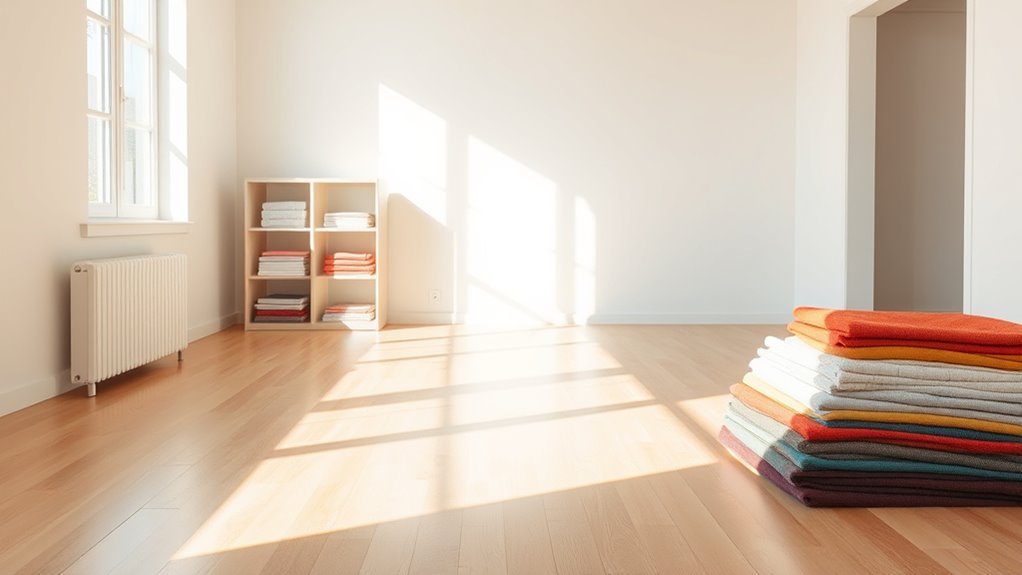
While clutter can feel overwhelming, effective decluttering methods can make the process manageable and even rewarding.
Try the Ski Slope Method, moving side to side in a room to prevent feeling swamped. You might also consider the Four-Box Method, where you sort items into 'keep,' 'throw away,' 'donate,' and 'sell' boxes.
Another approach is Micro-Decluttering, focusing on small areas for quick wins. If you're looking for a challenge, join the Minimalism Game, decluttering a number of items each day that matches the date. This challenge encourages intentional living by promoting awareness of consumption and the value of your belongings.
Lastly, adopt the Organizational Triangle by giving each item a home and storing similar items together.
These methods can help you regain control over your space and lighten your emotional load.
Strategies to Prevent Re-cluttering

To keep clutter from creeping back into your life, it's crucial to establish proactive strategies.
Start by thoroughly decluttering, removing unnecessary items to create space for what you truly need or love. Assign a home for each item, making it easier to maintain organization.
Implement the "one in, one out" rule to balance your belongings—when you acquire something new, let go of an old item. This is essential because creating a vision for your ideal home helps prevent future clutter from accumulating.
Establish daily routines, like cleaning surfaces and returning items to their designated spots, to keep your environment clutter-free.
Finally, practice mindful consumption by being aware of your purchases and their impact on your space, ensuring that you only bring in valuable items.
These strategies will help you maintain a clutter-free lifestyle.
Organizational Techniques for Success

Effective organizational techniques can transform your daily life, making it easier to manage tasks and achieve your goals.
Start by mastering time management, using tools like calendars and project management software to keep track of deadlines. Set clear goals to guide your efforts and prioritize tasks to focus on what's most important.
Don't hesitate to delegate when necessary; it maximizes team efficiency. Embrace analytical thinking to make informed decisions and pay attention to detail to ensure quality outcomes. Additionally, fostering a strong employee experience can significantly contribute to overall productivity.
Incorporate methods like Getting Things Done or bullet journaling to consolidate tasks. Regularly plan your week or month, segment larger projects into manageable tasks, and encourage feedback to continually refine your approach.
With these techniques, you'll boost productivity and reduce stress.
The Role of Professional Help

Organizational techniques can lay the groundwork for a more manageable life, but sometimes the task of decluttering feels overwhelming. That's where professional help comes in.
These experts understand the emotional ties you may have to your belongings and approach your situation with compassion and without judgment. They specialize in hoarding cleanup, offering tailored solutions that meet your specific needs. LifeCycle Transitions has over a decade of experience in providing hoarding solutions, ensuring you receive the best care possible. They recognize the importance of open communication to help you express your feelings about letting go of items.
From initial assessments to goal setting, they create customized plans to make the process smoother. Their services include sorting, packing, and thorough cleaning, ensuring a complete decluttering.
With their psychological insights, they provide emotional support, helping you make tough decisions about what to keep or let go. Trusting professionals can transform your space and your life.
Building a Support System

Building a support system can make a significant difference in your decluttering journey. Joining local decluttering groups offers motivation and accountability, as you share experiences and strategies with others. Participating in community clean-up events fosters a sense of responsibility while helping you connect with like-minded individuals. Online forums and social media groups can provide valuable resources and inspiration to keep you on track. Engaging your family members in decluttering tasks promotes teamwork and shared responsibility. Assigning specific tasks helps distribute the workload and ensures everyone's involved. Regular family meetings to discuss progress and challenges can strengthen bonds and enhance communication. By building this support system, you create an encouraging environment that makes the decluttering process more manageable and enjoyable. Additionally, focusing on progress as a group can lead to a collective sense of achievement that boosts motivation. Involving family members can also help in understanding financial obligations that may arise from shared assets during significant life changes.
Setting Boundaries for a Clutter-Free Home
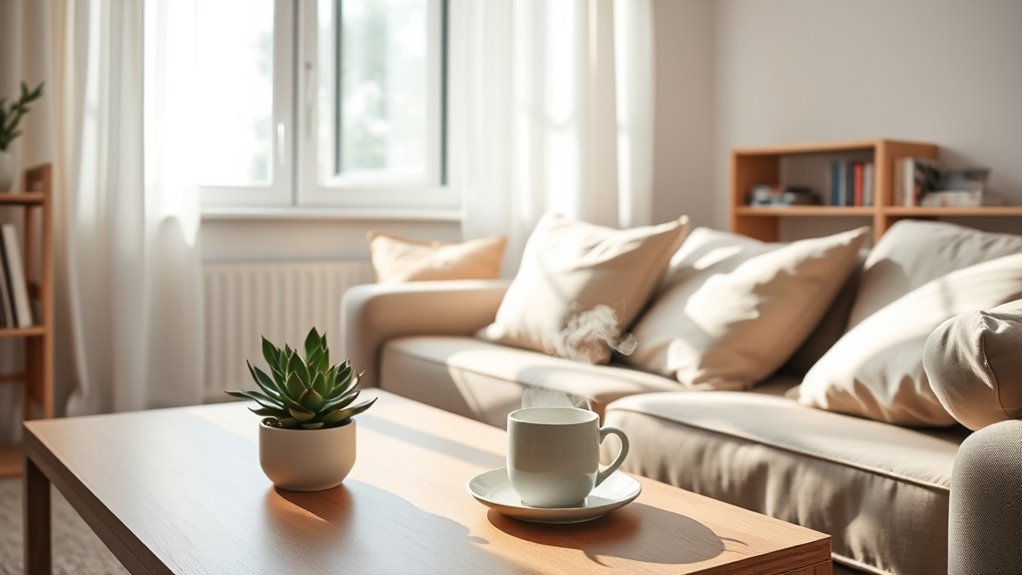
Creating a supportive environment is a great start, but to truly maintain a clutter-free home, you need to set clear boundaries. Establish specific storage spaces for your items; a full drawer signals no room for more. Stick to shopping lists to avoid impulse buys, and adopt a one-in-one-out policy to keep your possessions balanced. Use baskets to limit small item accumulation and encourage quick sorting. Involve your family in setting these boundaries to ensure everyone's on board. Remember, starting small can build your confidence in saying "no" to excess. Additionally, establishing clutter boundaries can help maintain a tidy living space and reduce emotional chaos. Regularly assess and rotate items to prevent clutter buildup, ensuring that your home remains organized and functional.
Celebrating Your Decluttering Journey
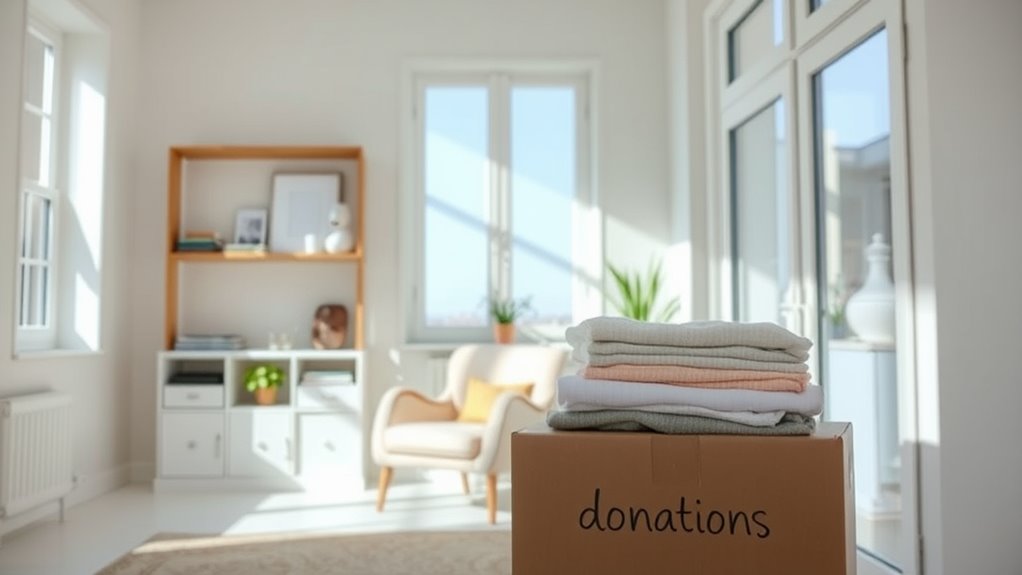
Celebrating your decluttering journey is essential to maintaining motivation and recognizing the progress you've made. Each step forward reduces stress, enhances productivity, and improves your overall health. A clutter-free space not only clears your mind but fosters creativity, allowing you to focus on what truly matters. As you create a welcoming environment, you'll find more quality time to connect with loved ones. Remember, every item you let go of is a step toward intentional living and financial savings. Better health is an added benefit of maintaining a clean and organized space, contributing to your overall well-being. Additionally, creating an organized space can lead to a more functional home, which supports your daily routines and activities. Reflect on your achievements, and embrace the sense of control that comes from decluttering. Celebrate your milestones, big or small, and let gratitude guide your journey. You're not just organizing; you're transforming your life for the better.
Frequently Asked Questions
How Can I Identify if I Have a Hoarding Disorder?
To identify if you have a hoarding disorder, reflect on your ability to discard items.
Do you feel persistent anxiety when thinking about getting rid of possessions, even if they hold little value?
Notice if your living space is cluttered, making it hard to use as intended.
If you find yourself excessively acquiring things or struggling with relationships due to your possessions, it may be time to seek professional help for further evaluation.
What Are the Long-Term Effects of Hoarding on Mental Health?
Hoarding can have serious long-term effects on your mental health. You might experience heightened anxiety and depression, which can amplify feelings of isolation and stress.
Living in clutter can lead to chronic fatigue and strain on your relationships with family and friends. Over time, these issues can even trigger suicidal thoughts, making it crucial to address hoarding behaviors before they escalate and significantly impact your overall quality of life.
Can Hoarding Be Treated Without Professional Help?
Like a ship lost at sea, you might wonder if hoarding can be navigated without professional help. While tackling it solo is possible, it often proves difficult.
You may struggle to confront emotional attachments and identify underlying issues. Starting small, like decluttering one room at a time, can help.
However, without guidance, setbacks are common. Ultimately, seeking professional support can provide the tools you need to effectively manage and overcome hoarding behaviors.
How Do I Manage Anxiety When Discarding Items?
To manage anxiety when discarding items, start by challenging your irrational thoughts.
Use cognitive restructuring to reframe your mindset.
Try imagery rescripting to visualize positive outcomes from letting go.
Create a thought list to lessen your emotional attachments.
Gradually expose yourself to the discarding process, beginning with small sessions.
Remember to keep it manageable and seek professional support if the anxiety feels overwhelming.
You've got this!
What Role Does Family Play in Addressing Hoarding Behaviors?
Family plays a vital role in addressing hoarding behaviors by offering emotional support and understanding.
You can create a safe space for open communication, helping your loved one feel less isolated. Educating yourself about hoarding fosters empathy and patience, enabling a more compassionate approach.
Working together to declutter and organizing belongings can make a significant difference. By setting healthy boundaries and encouraging professional help, you can support their journey toward managing the disorder effectively.
Conclusion
As you clear the clutter, imagine each item you let go as a weight lifted from your shoulders. With every space you reclaim, you're not just tidying up your environment; you're also freeing your mind and spirit. Embrace this journey as a transformation, where each step forward symbolizes a brighter, lighter future. Remember, decluttering isn't just about possessions—it's about creating room for joy, peace, and the life you truly want to live. So, take that leap!








